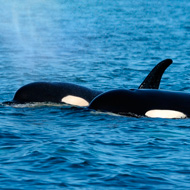Killer whales offer clues on human menopause

Post-menopausal killer whales were observed leading their social groups in salmon foraging grounds.
New research shows female killer whales play a vital role in their social groups after menopause, helping their families to find food in difficult times.
Humans and some whales are the only species to live many years after giving birth to their last offspring. Female killer whales generally breed between the ages of 12 and 40 but they can live up to 90 years.
Researchers from the Universities of Exeter and York, in partnership with the Center for Whale Research in Washington State, explored why female killer whales live so long after menopause. It is thought these animals could offer insights into menopause in human females.
Professor Darren Croft from the University of Exeter told BBC News: "From an evolutionary perspective, it's very difficult to explain. Why would an individual stop having their own offspring so early in life?"
Studying orcas in the wild "could help us reveal some of the mystery of why menopause evolved," he added.
The team watched hundreds of hours' worth of video footage, showing the interactions of family groups in the North Pacific coast in the USA. Post-menopausal killer whales were observed leading their social groups in salmon foraging grounds. This leadership role was found to be much more prominent in difficult years when salmon was scarce.
Family social structures are known to be critical to whale survival and Prof Croft said the population they are working with are "living on a knife edge" which could see them go extinct in the next century.
"The population has been listed as endangered since 2003," he explained. "Two critical questions have been highlighted - what is causing decreased reproduction and increased mortality."
Now, researchers are planning to use drones to find out more about the social interactions of killer whales and how they support each other. They believe this could 'revolutionise' our understanding of whale behaviour. The team have launched a crowdfunding campaign to fund the next stage of their work.



 The Veterinary Medicines Directorate (VMD) is inviting applications from veterinary students to attend a one-week extramural studies (EMS) placement in July 2026.
The Veterinary Medicines Directorate (VMD) is inviting applications from veterinary students to attend a one-week extramural studies (EMS) placement in July 2026.